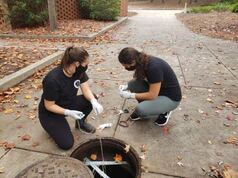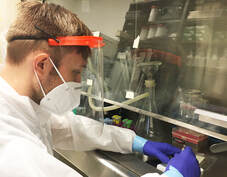Our research is focused around water, waterborne disease and microbial ecology of pathogens. We study the interactions between environment, microbe and hosts, be they humans or others, to better understand fate, persistence and transmission of pathogens and infectious diseases. The work in our lab encompasses a range of problems in environmental microbiology including source tracking for fecal pollution in fresh and marine waters, climate change impacts on waterborne diseases, landscape ecology in explaining disease risk, and ecology and evolution of environmental pathogens. While much of our research is focused on coastal and marine systems, we work on a full continuum of water types from black water streams in south Georgia to coral reefs in the Caribbean. We are pleased to work with partners in ecology, marine science, epidemiology, veterinary medicine, geography and genetics to address these issues.
Vibrio ecology
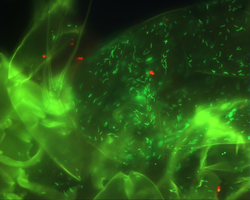
Environmental Interactions in Vibrio Ecology
Vibrio are among the most commonly cultured bacteria from marine waters and contribute greatly to the basic ecology of marine systems; however, among this broad group several species are well adapted pathogens (to humans, corals and other organisms). Because Vibrio are particularly adept at exploiting a wide variety niches, whether host-associated or otherwise, investigations into their ecology in the marine environment can be used to help explain their ability to act as pathogens. Specific projects in the lab are evaluating how Vibrio respond to episodic influxes of desert dust. Saharan dust events contribute essential trace metals and nutrients to otherwise oligotrophic waters of the tropical Atlantic Ocean. Vibrio are excellent opportunists and can grow quickly with dust deposition. Microbial responses to these events may have a large influence on biogeochemical cycling over short time periods. Work in our lab is also investigating Vibrio role in coral disease process.
Vibrio are among the most commonly cultured bacteria from marine waters and contribute greatly to the basic ecology of marine systems; however, among this broad group several species are well adapted pathogens (to humans, corals and other organisms). Because Vibrio are particularly adept at exploiting a wide variety niches, whether host-associated or otherwise, investigations into their ecology in the marine environment can be used to help explain their ability to act as pathogens. Specific projects in the lab are evaluating how Vibrio respond to episodic influxes of desert dust. Saharan dust events contribute essential trace metals and nutrients to otherwise oligotrophic waters of the tropical Atlantic Ocean. Vibrio are excellent opportunists and can grow quickly with dust deposition. Microbial responses to these events may have a large influence on biogeochemical cycling over short time periods. Work in our lab is also investigating Vibrio role in coral disease process.
Environmental Sources of Antibiotic Resistance
Coral Disease
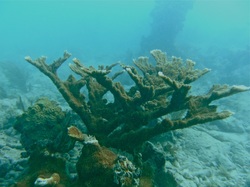
Coral Microbial Ecology / Microbiomes and Disease
Microbes play a critical role in coral health, acting as symbionts and a key component in the coral holobiont and as potential pathogens. Coral disease is increasingly recognized as an important driver in localized coral decline. We are investigating white pox disease in the Elkhorn coral of the Florida Keys. Our work is addressing fundamental explorations of the microbial diversity and function in the coral holobiont. Additionally, we are working on ecology of one of the etiological agents of this disease, Serratia marcescens. Strains that cause this disease have been linked to human sewage in the Florida Keys. On-going work is evaluating changes in the disease and pathogen over time and the intersection of sanitation issues on ecosystem health.
Microbes play a critical role in coral health, acting as symbionts and a key component in the coral holobiont and as potential pathogens. Coral disease is increasingly recognized as an important driver in localized coral decline. We are investigating white pox disease in the Elkhorn coral of the Florida Keys. Our work is addressing fundamental explorations of the microbial diversity and function in the coral holobiont. Additionally, we are working on ecology of one of the etiological agents of this disease, Serratia marcescens. Strains that cause this disease have been linked to human sewage in the Florida Keys. On-going work is evaluating changes in the disease and pathogen over time and the intersection of sanitation issues on ecosystem health.
Water as a Risk Factor for Salmonella Infection
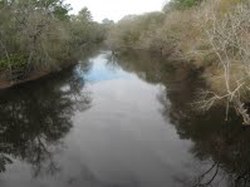
Landscapes, wildlife, and biogeography as factors in Salmonella ecology
Salmonella infections remain a top cause of enteric disease in the US and elsewhere, but despite more than a decade of attempts to bring down the number of cases and outbreaks through improvements in the food safety system, rates remain high. We are examining the role of landscape, weather and climate in the incidence of Salmonella cases, focusing on transmission routes that may not be associated with food exposure. We are also interested in wild animals as both carriers of Salmonella and potential sentinels, especially those that frequent water bodies that may have high Salmonella loading.
Salmonella infections remain a top cause of enteric disease in the US and elsewhere, but despite more than a decade of attempts to bring down the number of cases and outbreaks through improvements in the food safety system, rates remain high. We are examining the role of landscape, weather and climate in the incidence of Salmonella cases, focusing on transmission routes that may not be associated with food exposure. We are also interested in wild animals as both carriers of Salmonella and potential sentinels, especially those that frequent water bodies that may have high Salmonella loading.
Coastal Water Quality
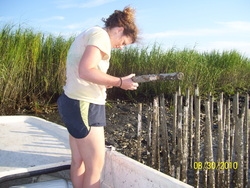
Coastal Pollution and Contaminants
Coastal Georgia boasts some of the largest expanses of salt marsh on the eastern seaboard, despite it's relatively short coastline, but development pressures are increasingly placing sensitive ecosystems at risk and may impact quality of water for human exposure. We have been exploring threats to water quality from on-site sewage disposal (septic systems) and climate variability and the potential role of the eastern oyster as a possible remediation tool. We are also investigating the effects of chemicals (pharmaceuticals and personal care products) of microbial ecology, especially among marine pathogens, such as Vibrio. Our group is also working on source tracking for human fecal pollution using enteric viruses.
Coastal Georgia boasts some of the largest expanses of salt marsh on the eastern seaboard, despite it's relatively short coastline, but development pressures are increasingly placing sensitive ecosystems at risk and may impact quality of water for human exposure. We have been exploring threats to water quality from on-site sewage disposal (septic systems) and climate variability and the potential role of the eastern oyster as a possible remediation tool. We are also investigating the effects of chemicals (pharmaceuticals and personal care products) of microbial ecology, especially among marine pathogens, such as Vibrio. Our group is also working on source tracking for human fecal pollution using enteric viruses.
Wastewater-based Epidemiology
|
Wastewater Monitoring
Wastewater-based testing has emerged as an innovative approach in infectious disease epidemiology, offering a promising method to quickly and efficiently determine potential trends in pathogen prevalence across entire communities, without obtaining clinical specimens. Both symptomatic and asymptomatic carriers shed SARS-CoV-2 in their feces; therefore, wastewater measurements reflect trends in community-level transmission on a near-real-time basis. Beginning in May 2020, following the shut down of UGA in response to the COVID-19 pandemic, the Lipp Lab began a weekly monitoring project to track levels of SARS-CoV-2 in Athens GA wastewater. This has provided an independent method to assess trends in the outbreak at UGA and around Athens. The Lipp Lab's wastewater monitoring data can be accessed on our dashboard. We update the dashboard weekly. Viral Sequencing from Wastewater Wastewater can also be mined for viral genomes to provide a method of understanding viral sequence dynamics and evolution at a community scale. Wastewater sampling has the potential to provide community level sequence analysis at a large scale by pooling samples from the entire population to track how viruses spread and evolve within or across entire populations over time. The Lipp Lab has partnered with UGA's Glenn and Bahl Labs to optimize methods for the sequencing and analysis of SARS-CoV-2 viruses from wastewater to help discover the emergence and spread of distinct SARS-CoV-2 variants, identify known variants of concern, and help track potential variants that may be subject to vaccine or diagnostic escape. |
Outreach
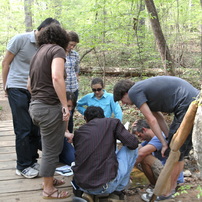
Water Quality and Sustainability in Athens, GA
Our lab works with local and campus partners at efforts to both track and improve water quality in Athens' streams and watersheds. We provide fecal indicator testing for the Upper Oconee Watershed Network (UOWN), which uses relies on the efforts of a large number of volunteers to collect water from nearly 100 stream sites in and around Athens Georgia. We have also worked with the UGA Office of Sustainability to study the effects of prescribed grazing (by goats!) on water quality in campus streams. We also provide targeted water quality monitoring for campus streams and recreational waters.
SciREN - Georgia
Founded by PhD student, Maite Ghazaleh Bucher, the Georgia branch of the Scientific Research and Education Network - SciREN, aims to link researchers with K-12 educators to bring science to schools. Free K-12 Lesson plans from SciREN are available here.
Our lab works with local and campus partners at efforts to both track and improve water quality in Athens' streams and watersheds. We provide fecal indicator testing for the Upper Oconee Watershed Network (UOWN), which uses relies on the efforts of a large number of volunteers to collect water from nearly 100 stream sites in and around Athens Georgia. We have also worked with the UGA Office of Sustainability to study the effects of prescribed grazing (by goats!) on water quality in campus streams. We also provide targeted water quality monitoring for campus streams and recreational waters.
SciREN - Georgia
Founded by PhD student, Maite Ghazaleh Bucher, the Georgia branch of the Scientific Research and Education Network - SciREN, aims to link researchers with K-12 educators to bring science to schools. Free K-12 Lesson plans from SciREN are available here.
Proudly powered by Weebly
